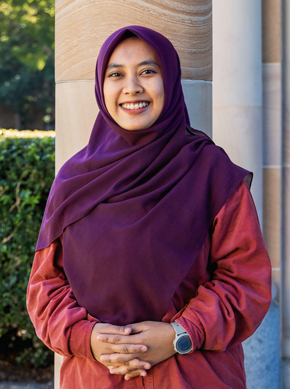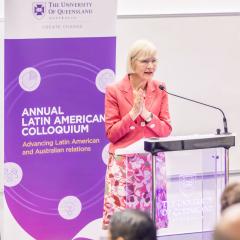From 2–13 June 2025, The University of Queensland proudly hosted the Australia Awards Short Course on Breaking Barriers: Promoting Inclusive Leadership in STEM, managed by KONESKI in collaboration with Australia Awards in Indonesia. This short course brought together 25 emerging leaders from Indonesia to explore the principles of Gender Equality, Disability, and Social Inclusion (GEDSI) and their application in the STEM sector.
In this Q&A, UQ speaks with Ifatul (Ifa) Khasanah, a passionate advocate for inclusive leadership in STEM (Science, Technology, Engineering, Maths). With a large and engaged social media following, Ifa uses her platform to inspire and educate others about equity in science and technology.
Ifa shares her remarkable journey from a small and humble village in Java, Indonesia, to becoming the first in her family and village to attend university. Ifa earned a degree in microbiology from the Institute of Technology in Bandung through a government scholarship, and she continues to champion access and opportunity for underrepresented voices in STEM.
What inspired you to apply for the short course, and how does it align with your STEM education work?
It is my first year of returning to work, after almost 2 or 3 years as a stay-at-home mother. Professionally, I want to learn about the GEDSI principles and how STEM are emerging in Australia so that I can take them back home.

Right now, I’m juggling two roles. I work as a science communicator and also run my startup, Maristem, which focuses on STEM education for families. I design workshops for parents and teachers, and I create educational resources like books and STEM kits. What started as a personal project has grown into something that’s reaching thousands of people. In just the first 3 months, Maristem had 750 paying customers, trained over 1,000 teachers, and partnered with two organisations - all without a marketing budget. Within 6 months, I gained 100,000 organic followers on Instagram and reached over 2 million people monthly. And so far, I’ve done it all on my own.
My audience is mostly women—about 80%—so I feel a strong responsibility to share science in a way that’s practical and empowering. One example is a post I made about egg yolk colour. In Indonesia, eggs with orange yolks are often marketed as “omega eggs” and sold at a higher price. But scientifically, the yolk colour doesn’t determine omega-3 content. It’s just pigment from the chicken’s feed. I explained this in simple terms and encouraged mothers to buy what they can afford and cook it well. That post reached nearly a million views. What touched me most were the comments from mothers who said they used to feel insecure because they couldn’t afford the “premium” eggs. That’s when I realised how misinformation can lead to unnecessary pressure, especially on women.
The short course helped me see that what I’ve been doing is just the beginning. Learning about GEDSI as a full framework opened my eyes to the deeper issues of access, equity, and representation. One session in particular made me reflect on my own unconscious biases—something I hadn’t considered before.
The most eye-opening part of the course was learning about Indigenous knowledge in Australia. I was amazed by how deeply respected it is, and how it’s integrated into scientific research and education. Every session began with an Acknowledgement of Country, and I saw how Indigenous perspectives are not just included—they’re valued. It made me think: who are the marginalised communities in Indonesia that I can reach through my work?
How do you plan to integrate the GEDSI principles from the short course into your teaching or outreach initiatives?
When I return home, I plan to create a new series of science content focused on practical knowledge for mothers, especially those from middle- to low-income backgrounds. I want to talk about affordable protein sources, proper washing techniques for cleaning non-organic vegetables, and other everyday science topics that can help families make informed decisions. I want to make sure that science isn’t just for the privileged—it should be for everyone.
Inclusive leadership in STEM starts at home. In Indonesia, many children don’t have access to quality science education, and mothers play a key role in shaping their curiosity. That’s why I focus on empowering parents to bring STEM into their daily routines. I run one-day workshops that show how simple activities—like cooking or gardening—can be rich in science learning. Inclusive leadership means recognising the barriers women face and designing solutions that fit their realities.
I’ve also seen how gender inequality affects women in STEM. Many of my peers graduated from top universities but had to leave their careers to care for their families. Even for educated women, the pressure to stay home is strong. And for those with less education, science often feels out of reach because it’s not communicated in a language they understand. That’s one of my biggest challenges—and motivations—as a science communicator.
This short course has given me new tools and perspectives to address those challenges. I now understand that inclusion isn’t just about who gets access—it’s about how we design and deliver knowledge. I’m excited to apply what I’ve learned to support more women and children in STEM, and to show that no matter your background, you can be part of the science conversation.
Read more UQ International Development news
UQ International Development helps build the capacity of people and organisations around the world to achieve their development goals.



